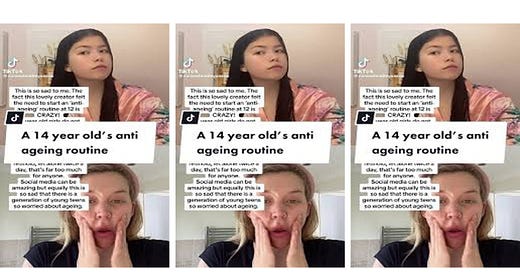A boot stamping on a human face forever
An interview about capitalism and beauty, with Jessica DeFino
Last week I wrote an article for Vogue on the newly popular and controversial beauty industry practice of ‘collagen banking’. Collagen banking, for the unitiated, is the practice of stocking up on collagen ahead of time (when you’re young) so by the time you hit 30, and your skin starts to change, you can simply dip into your savings rather than having to resort to fillers or injectables or expensive skincare to turn back the clock.
As with all medicalised, pseudo-scientific ‘youthful skincare’ trends, nobody actually knows if the science behind collagen banking is legit. But its existence is revealing against a backdrop of spiralling concern over looking young forever. Yes, we’ve always cared about this, but it feels more potent now, when so-called Sephora tweens are raiding Drunk Elephant products and 14-year-olds are posting anti-ageing routine videos on TikTok. As part of research for this article I found out there are skincare companies specifically targeted towards Gen Z (the eldest of whom would now only be around 26, the youngest 12), with taglines like “getting old is getting old”.
For the piece, I spoke to beauty critic Jessica DeFino, author of The Review of Beauty Substack (previously The Unpublishable). I think there’s a certain snobbery about beauty writing in general, because it’s seen as frivolous or inherently narcissistic. And that’s silly, because what we decide is beautiful never exists without context. It’s always more than product or trend, it’s sociological and political, and, in the case of collagen banking, inherently neoliberal. What is more capitalist than taking the concept of banking, saving up for a rainy day, and applying it to our own appearance?
I love Jessica’s writing because it always digs deep into the forces that influence the beauty industry — she reviews the industry, rather than the products. And so, although I only managed to include a few lines of our interview in the eventual piece for Vogue Business, I wanted to publish the rest of our conversation in full here.
JDF: There’s nothing new to this trend, in terms of how we have been talking about collagen in the beauty industry for years and years. It’s just kind of a new spin on it. If there is anything new about it, it’s the sense of urgency — collagen banking makes it seem like you have to rush and up your collagen now while there’s still time. It’s more panic inducing, more urgent than how we’ve talked about it in the past.
The term ‘banking’ is interesting, an ‘investment’... like the internet term ‘face card’, these are all not so subtle nods to beauty being a form of capital. Pretty privilege exists. Study after study shows that people who meet the standard of beauty benefit economically, professionally, socially, and people who don’t meet the standard of beauty are punished for it. You incur social, financial, political, economic consequences. This idea of ‘banking’ your collagen reinforces that idea of beauty as form of capital that many women feel they must invest in in order to get a return on their investment in other ways, like socially, in the work place etc. If there’s anything interesting in this new wave of collagen investment its this acknowledgement of beauty as a blatant form of capital.
There is a very real fear of looking older. The beauty standard is becoming increasingly unreal, unrealistic, inhuman, and it’s accelerating at a really rapid pace thanks to advancements in technologically, thanks to the prevalence of social media, thanks to AI. Our digital photo doesn’t age. An AI centric ideal, which is what we’re moving towards, I think, lends itself well to a youthful or ageless ideal. I think we’re terrified of looking older; we’re terrified of being older. We’re ageing into an increasingly terrifying world. If you look at statistics of young women especially in terms of levels of depression and anxiety, we’re scared of being in the world, we’re scared of ageing into this world, we’re scared of the responsibilities that come with that. We’re faced with our mortality in different ways; the pandemic, accelerating climate change, the war in Gaza. These are scary things and controlling the body has always been a coping mechanism, because the world feels so out of control sometimes it feels like your body and your face is the only thing you can control. This has been at the root of eating disorders for a long time, they’re a way of exerting control when you feel out of control. And I feel like this obsession with anti-ageing is I would go so far as to say a disordered way of enacting control on the body as a coping mechanism for feeling out of control in other ways.
Separate to that people have been looking for the fountain of youth for hundreds of years so this is a classic human longing, a classic human fear, to look younger, to be younger, to not grow up, to not die. This is really easy for the beauty industry to capitalise on, and that’s what we’re seeing here.
If you look at the factors that break down collagen, it’s all lifestyle based. It’s things like smoking and sun exposure, and at the same time we’re seeing cigarettes and tanning coming back into vogue. So it makes absolutely no sense when you look at the people who are interested in collagen banking and their other lifestyle choices. We’re just not leading lifestyles that are supportive of our collagen in other ways, so to me that just shows a lack of true intellectual curiosity about what collagen is, what breaks it down, and instead jumping on this consumerist bandwagon of collagen banking. If you look at the science of it it’s very straightforward. If you want to support your collagen, great – it helps with wound healing, joint health – it’s pretty simple to do it. You need vitamin C in your diet. You need glycine and prolene, you need the amino acids found in vegetables in red meat. You need minerals like copper - all of these are found in a balanced diet. Even collagen peptides, they break down in your body! And collagen topical products are too big to be absorbed in the skin. You can’t apply a collagen product on the top layer of your skin and have it absorb in the bottom layer, it doesn’t work like that. So if you care about your collagen it’s pretty simple; have a balanced diet and wear sunscreen. That’s a pretty good way to preserve your collagen as much as you can, because again, no matter what you do, it is going to decrease as you age, which is normal and natural.
The other thing that’s interesting is there’s so much panic in the beauty industry is that collagen declines as you age and your skin gets less plump. But your skin has this amazing ability to slow the rate of cellular renewal, so you have a thicker barrier on top of the dermus – the layer of your skin that holds collagen. The body has this give and take built into it. We don’t need to worry too much about it. The beauty industry tells us we need to, like, exfoliate more as we age, and at the same time completely ignores the fact that this layer of the skin is thicker for a reason, it’s to protect us from decreasing collagen!
This does fall into the category of pseudoscience. What the beauty industry loves to do is take a kernel of truth and spin it out into a pseudoscientific concept. Here, the kernel of truth is that: yes your collagen levels do start to decline after a certain age, after, like, 25 or 30. But that’s not a disaster, that’s no less normal than going through menopause. It’s just one of the many ways the body changes as it ages and it’s not something to particularly panic about. Because it’s based on scientific levels of a substance in your body this is medicalised and framed as a medical or healthcare measure to protect your collagen levels, but if that was the case wouldn’t we also be worried about things like the collagen in our joints? Collagen does so much more than give us plump, elastic skin. The only role of collagen that gets any airtime in the beauty media is in terms of skin elasticity and youthful aesthetic. I don’t think there’s anything health-centric here and I don’t think there’s any new science here to back up the idea of collagen banking - it’s old science that has been twisted out into pseudoscience. Sorry, your body just loses collagen! It’s just what happens as we age!
Some other things I wrote recently:
A longread on what I am calling ‘down bad Catholicism’ for Irish Times Magazine
An obituary for Leo Varadkar, Ireland’s dweebiest politician
I also finally finished edits on my book and am beginning to send out proofs! Which is really exciting!
Things I read and liked recently:
Caledonian Road, by Andrew O’Hagan
The Heart in Winter, by Kevin Barry







Loved the Vogue Business article! Thank you for sharing the rest of this :)
One of the facets of the beauty industries insidiousness is the targeting of certain psychological vulnerabilities which are promulgated through optics and influencers about not aging and having a line free, pouty, doll faced appearance, this can only be achieved for most of us with Botox, fillers, dermabrasion, vampire facials and all the other usual suspects of fad diets and extortionate skin products…we are raising generations of aesthetically traumatised women and young girls and something has to give, if we’re pouring our fear of the uncertainty of our times into the beauty industries obsession with never aging as an extrinsic place holder for this fear and exacerbating it as a perseverative obsession that we’ll never conquer then we need to counter it with something more powerful, ED are at unprecedented levels, cosmetic surgery too, non invasive procedures and within this is toxic dissociation, body and image dysmorphia….is this coincidental or is the beauty industry supporting using our feelings of lack of agency in an increasingly turbulent world as a means to redirect us further into narcissism and pointkess depersonalisation as we pursue a standardised beauty ideal that robs us of any individuality…? I’m an ND person and I just don’t understand why our social currency is still based on such a reductive paradigm.